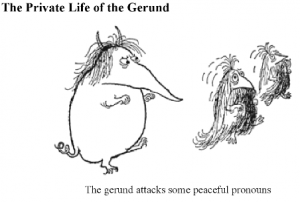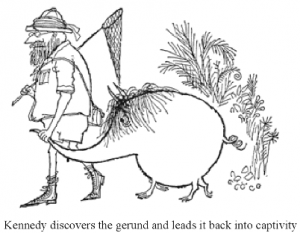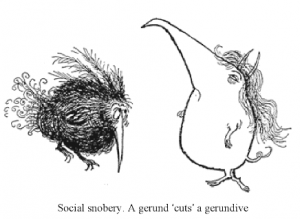Gerund: Difference between revisions
Jump to navigation
Jump to search
Amwelladmin (talk | contribs) No edit summary |
Amwelladmin (talk | contribs) No edit summary |
||
| (11 intermediate revisions by the same user not shown) | |||
| Line 1: | Line 1: | ||
{{a|plainenglish| | |||
[[File:Gerund_Pronouns.PNG|center|||frameless]] | |||
[[File:Gerund_Shut_Out.PNG|center|||frameless]] | |||
[[File:Kennedy_Gerund.PNG|center|||frameless]] | |||
[[File:Gerund_cuts_gerundive.PNG|center|||frameless]]}} | |||
A [[gerund]] is a [[verb]] form which functions as a [[noun]], in [[Latin]] having a (declinable) ending ''-ndum'', and in English ending in ''-ing'' | |||
''Do you mind my doubting you?'' (as [[René Descartes]] once said to himself). “Do you want that throwing in the bin?” Compare with a [[gerundive]], a [[verb]] which functions as an [[adjective]]. | |||
[[ | Where better to end than the grate [[nigel molesworth|n molesworth]] the curse of st custards, [[as any fule kno]]. | ||
[[ | {{sa}} | ||
*[[nigel molesworth]] | |||
*[[Plain English]] | |||
*[[Grammar]] | |||
{{c|Philosophy}} | |||
Latest revision as of 13:30, 14 August 2024
|
Towards more picturesque speech™
   
|
A gerund is a verb form which functions as a noun, in Latin having a (declinable) ending -ndum, and in English ending in -ing
Do you mind my doubting you? (as René Descartes once said to himself). “Do you want that throwing in the bin?” Compare with a gerundive, a verb which functions as an adjective.
Where better to end than the grate n molesworth the curse of st custards, as any fule kno.